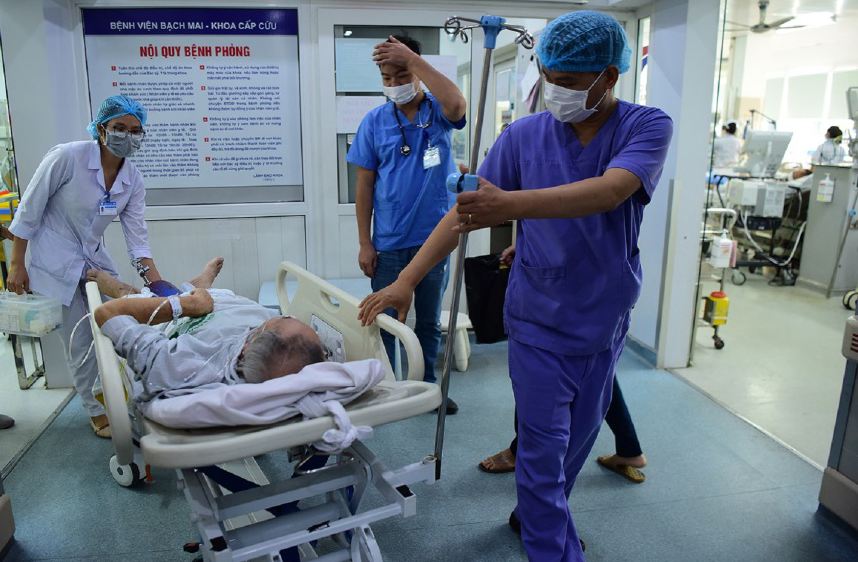
At a district hospital in Son La, a medical team led by doctor H.K assisted a woman in labor with a ruptured amniotic sac and a fetus already descending into the pelvis. They stayed up all night, dedicating their full effort to ensure a safe delivery for both mother and child. The family expressed gratitude afterward, but they could not be found the next morning.
“When patients leave without notice, this means that they don’t pay treatment costs, and each doctor and nurse has to contribute VND50,000-100,000 to cover the hospital fees,” Dr K said.
“In this case, if the patient had stayed to complete the procedures and had health insurance, the amount of money they had to pay would not have been high, but they still escaped from the hospital,” he added.
At the hospital where Dr K works, patient absconding is not uncommon, and in such cases, the financial burden falls on the medical staff.
In the first four months of 2025, Binh Duong Provincial General Hospital admitted 55 emergency cases without relatives. Of these, 11 patients were successfully treated and discharged but paid no fees.
Vy Hong Ky, Director of Moc Chau General Hospital (Son La), noted that patients leaving after emergency care or treatment is a frequent occurrence at the facility. Between May 21-23, two patients left the hospital without permission within 24 hours of admission.
The first case was N.V.B. (33, Hanoi), admitted for pesticide poisoning. Medical staff worked through the night of May 22 to treat the patient, but on the morning of May 23, nurses reported the patient was gone, and the phone number on the medical record was unreachable.
The second case was a male patient admitted at 7pm on May 20 for alcohol poisoning, who quietly left the ward the next morning.
According to Ky, departments have previously reported such cases to hospital leadership. However, due to financial constraints, departments now handle these internally by requesting reduced bed days, canceling tests, or even deleting medical records to minimize compensation costs. Hospital leaders are aware but lack a suitable solution.
Regulations on hospital fee payment
In the past, many hospitals required patients to prepay fees before admission, which sparked public outrage as it delayed treatment for the poor, worsening their conditions. Hospital overcrowding, prepayment issues, and the bad attitude of some medical staff at times reduced public satisfaction with healthcare facilities.
In Directive 06 dated March 29, 2016, the Ministry of Health (MOH) mandated that hospitals “do not collect prepayments from patients with health insurance for outpatient visits.”
Currently, hospitals do not require prepayments for patients with health insurance seeking outpatient care or emergency treatment. For inpatients, prepayments are only collected when patients are prescribed to use high-cost treatments, and only for costs not covered by health insurance.
This policy has garnered widespread support, especially from those in difficult circumstances, as it ensures timely access to healthcare service.
However, it has also posed challenges. Some patients don’t pay fees after treatment or even abscond, causing financial losses for hospitals. In some cases, medical staff must cover these unpaid fees out of their own pockets.
What do hospitals do?
Associate Prof Nguyen Lan Hieu, Director of Hanoi Medical University Hospital and Binh Duong Provincial General Hospital, said in the first four months of 2025, Binh Duong Hospital admitted 55 emergency cases without relatives, including nine foreign patients (one of whom was illegally residing and deported) and 10 abandoned newborns. Of these, 11 patients were successfully treated and left without paying any fees.
Many patients in financial hardship couldn’t afford the fees, requiring support from the hospital’s Social Work Department and philanthropists.
At Hanoi Medical University Hospital, the rate of non-payment is low, as most patients and families respect the medical staff’s efforts. The hospital has eliminated prepayment requirements for consultations, allowing patients to proceed directly to examination rooms and pay only after tests or treatments are prescribed.
Leaders of Viet Duc Friendship Hospital (Hanoi) said the hospital follows the Ministry of Health’s regulations, with administrative procedures minimized, and all resources mobilized to save patients.
Nguyen Trung Cap, Deputy Director of the National Hospital for Tropical Diseases, emphasized that in emergencies, saving lives is the top priority, with administrative tasks handled later. Many patients are brought in by passersby or come from remote areas without identification.
In critical cases, doctors may only have time to tell families, “We need to operate immediately to save patients.” Thanks to this approach, many lives have been saved, even if fees sometimes go unpaid.
Vo Thu